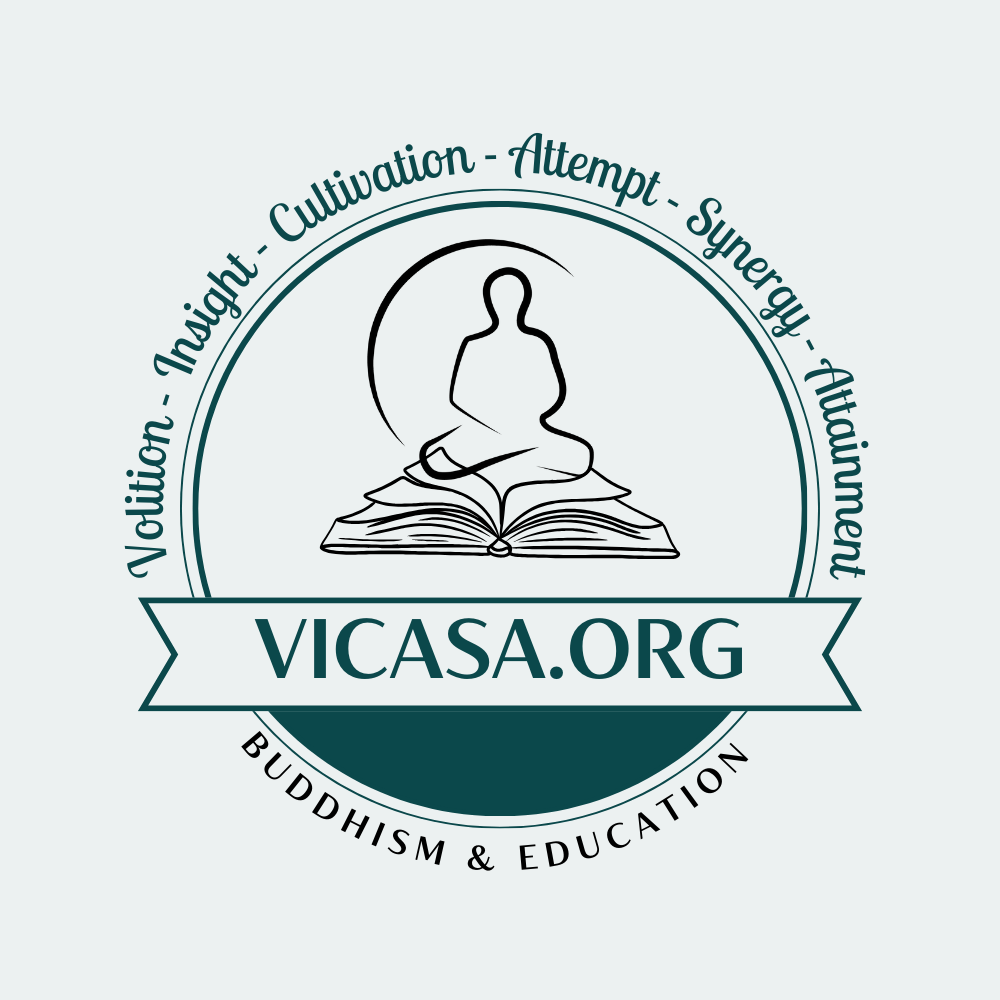
With our duty as Buddhists, monastics and lay devotees, the Blessed One taught, there is nothing more important than concentrating on studying and applying His teachings into practice to gradually diminish suffering for ourselves and/or can deliver anyone who is connected with us to contribute to preserving the due Dhamma, as the Buddha’s teaching prior to Nibbanna:
“Tasmātiha bhikkhave ye may te mayā dhammā abhiñā desitā, te vo sādhukaṃ uggahetva āsevitabbā bhāvetabā bahulīkātabmā – Monks, I apparently articulated the truth (Dhamma) that I myself realized truth and imparted to you. You need to skillfully study, cultivate, foster, and practice these dhammas regularly.” (1)
Thus, this article aims to recommend the direction of practice to Buddhist disciples from personal observation through the path of Dhamma learning and practice.
I. Dhamma theory
1.1. Definition
In Theravada Buddhism, Pariyatti is a Pāli term that means ‘theory,’ concentrating the study of Buddhism, correlated with the Dhamma as incorporated in the Buddhist scriptures. From ‘the divisions of pariyatti in its three Baskets’ (tīsu piṭakesu tividho pariyatti-bhedo), pariyatti encompasses the Suttanta, Vinaya, and Abhidhamma of the Pāli canon. It also means a theoretical comprehension of Dhamma acquired through reading, investigation, and learning. It is associated but contrasted with patipatti, which implies applying the theory, and pativedha, which indicates penetrating it or, experientially recognizing the truth of it.
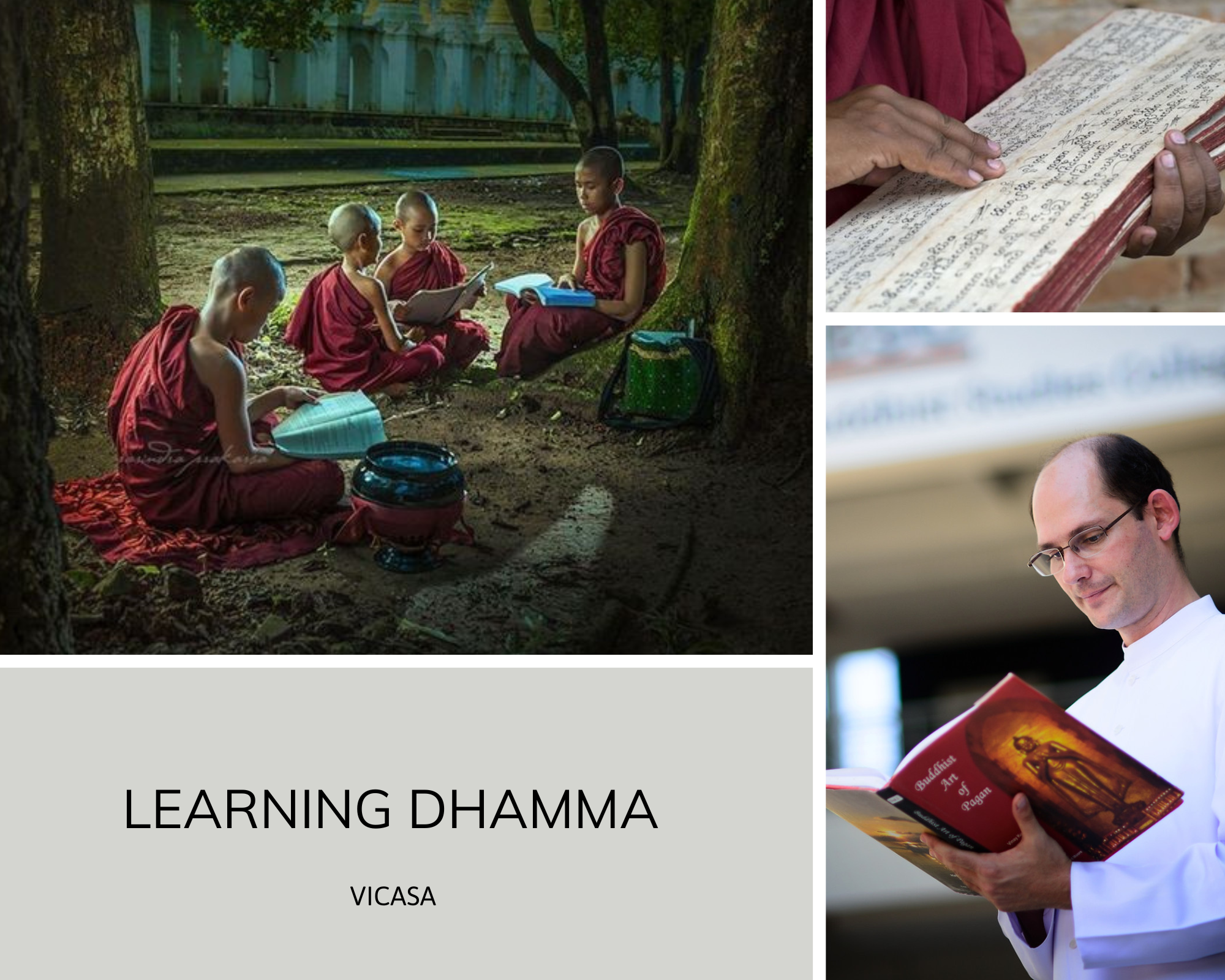
1.2. The learning path for the youth
If you have yet determined for yourself a solid dhamma learning and practice environment to make your own efforts to practice effectively without attending typical or Buddhist education, the young need to at least attempt to graduate from high school and continue to attend higher education and become degree holders. Relying on a personal capacity, if you intend that your degree is only valuable for use in the Vietnam Buddhist Sangha or the country, you can continue a bachelor’s Buddhist degree program in the form of on-campus or distance training at some Buddhist Universities in Vietnam.
For those who are not passionate about English or do not have the ability to learn foreign languages, you can choose to earn a bachelor’s degree in Buddhist studies from the beginning. Further, you can study a second degree to expand your knowledge or flourish your domestic qualifications with the following majors: Religious Studies, Education, Preschool Education, Literature, Psychology, Philosophy, and Cultural Studies.
For those who prepared a stable English base after graduating from high school, they can select as follows:
1.2.1.
English Linguistics or English Language Teacher Education – full-time, part-time, or distance/online learning. The current formal system has many schools enrolling students in this major with diverse university benchmarks. If studying part-time or online, you can opt for a complete English Linguistics program at these schools: University of Social Sciences and Humanities Ho Chi Minh City – Hanoi, Open University Ho Chi Minh City – Hanoi, Hanoi University, University of Foreign Languages – VNU, Thu Dau Mot University, Thai Nguyen University, Quy Nhon University, Tra Vinh University, Dong Thap University. If studying part-time or online in English Language Teacher Education: HCMC University of Technology and Education.

1.2.2.
With a solid foundation of English knowledge and the ability to self-improve basic Buddhist teachings as well as equip yourself with Buddhist English vocabulary, you can decide on appropriate international schools to endeavor to accomplish a bachelor’s degree in Buddhist studies. Then, depending on your financial ability or personal efforts to receive a scholarship, you should approach another country to advance your wisdom and qualifications to switch the environment and accumulate more personal experience. Or you can study for free at ITBMU – International Buddhist University in Yangon, Myanmar. This school accepts students who have graduated from high school and are eligible to study programs from Pre-Bachelor, Bachelor, Master, and Doctorate.
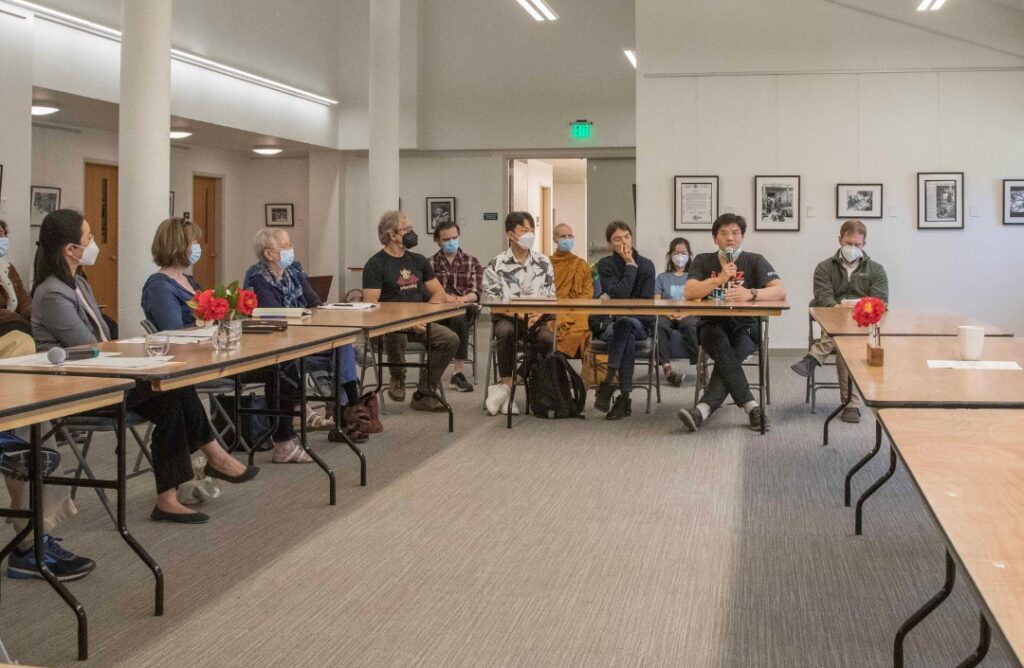
1.2.3.
Study the Department of Buddhist English at Vietnam Buddhist universities if you are not confident enough to accomplish a national bachelor’s in English Linguistics. As long as you have an English basis from twelfth grade and put effort into studying, you will be able to aim for the Buddhist English program.
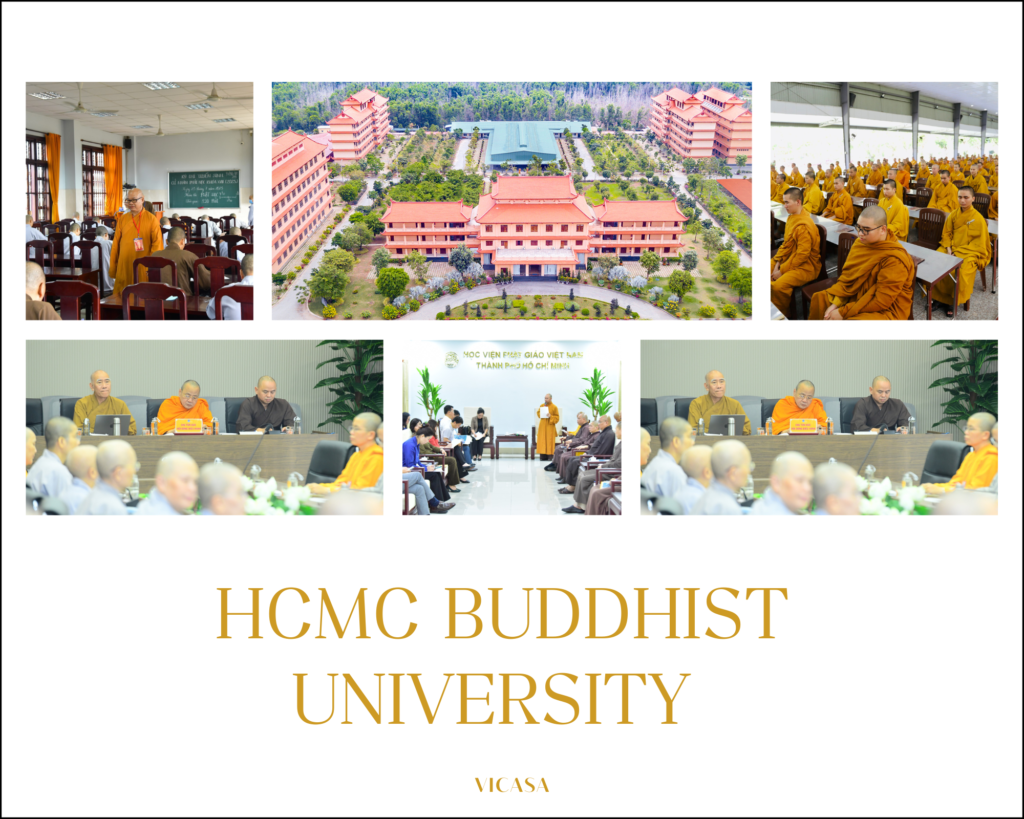
Suppose anyone genuinely aspires to evolve and productively apply the foreign language knowledge they have acquired. In that case, they should pursue the English Linguistics major at national universities from the beginning to be exposed to a variety of subjects, aiming to hone their skills and understanding of quality knowledge systems. Having completed a bachelor’s degree program in English Linguistics, you will be capable of equipping yourself with additional knowledge of Buddhist English to study abroad or study online graduate and master’s programs with international accreditations: Buddhist Studies, Religious Studies, Education, Psychology, and Philosophy in varied countries: America, England, Australia, Canada, Finland, Singapore, Myanmar, Sri Lanka, Thailand, India.
For those oriented to study to serve, such as becoming an English teacher, teaching Buddhist English, translating and interpreting the Dhamma, profoundly scrutinizing Tipitaka, or becoming an international lecturer, you should strictly invest time in the Bachelor of English Linguistics, full-time, in-service, or online. This program facilitates the most effective fundamental knowledge and crucial skills to be able to use English proficiently and share comprehension with others. If you are still unconfident after achieving the bachelor’s program, you might nurture your ability by pursuing a master’s degree in English Linguistics or an international master’s program, with priority given to Western European countries, to solidify your English academic ability, expand your understanding, and learn self-research methods, as well as strongly consolidate skills and receive qualifications that suit international standards. In this temporary digital age, it is easy to study online at varied schools worldwide to save costs.
Thus, if you can discern the practicality of English in worldly and monastic life, the youth or young renunciants will be able to dedicate time to learning and practice processes arduously. Then, we will be able to explore English documents directly to apply our practice. In addition, based on your ability and aspiration, you can study a variety of other foreign languages, such as Pali, Sanskrit, Burmese, Thai, and Chinese, to directly inspect the Tipitaka and easily communicate with instructors or meditation teachers where we arrive to learn and practice.
2. Dhamma practice
2.1. Definition
Paṭipatti signifies the practice of Dhamma, as opposed to mere theoretical wisdom by the cultivation of sila, samadhi, and pañña (morality, concentration, and insight) corresponding to the Eightfold Noble Path. From a Buddhist viewpoint, nothing but insight can realize the ultimate truth through meditation. It is said in the Ghañãkàra sutta commentary:
“Pasanno ca pasannākāraṃ kātuṃ sakkhissati.” (2) – True devotees of the Triple Gem can show their devotion through practice.
2.2. The path of dhamma practice
After completing the dhamma study journey, the young can move on to devoted practice. By dint of understanding the teachings, you can choose a meditation center or practice environment that satisfies your personal level and condition to industriously cultivate for a fixed period to observe positive changes in yourself. Devotees just starting out with the practice should select suitable hermitage places to meditate intensively. That is because if you determine to concentrate on practical cultivation but also be involved in other activities, your mind will fluctuate, making it struggle to achieve results in meditation. Because in many sutras, the Buddha often criticizes monks for performing the following:
- Pleasure in working (kammārāmatā)
- Pleasure in talking (bhassārāmatā)
- Pleasure in sleeping (niddārāmatā)
- Pleasure in the crowded (sanghaṇikārāmatā)
- Not controlling the faculties (indriyesu agutta dvāratā)
- Intemperance in eating and drinking (bhojāne amattaññutā)
- Not attempting to practice Samatha-Vipassana Contemplation with moderation in sleep and rest (jāgariye ananuyuttā)
- Indolence in not practicing Samatha-Vipassana (kusita, kosajja)3
If practitioners need to do anything for the Sangha or themselves, they should try to terminate it as quickly as possible to return to their meditation with a still mind. If they enjoy working too much, it is an obstacle to meditation as solid and powerful mindfulness on the meditation object is then challenging to attain: enjoying work does not produce good concentration. (3)
If you have been practicing for a few years without development, you need to put in more effort. If you still do not see progress, you can return to profoundly studying and investigating Dhamma or serving in teaching and sharing apprehension. Some young disciples, who need more conditions or want to pursue the path of absorbing dhamma theory initially, can also follow the path of practice first and study later as youth have more time and options.
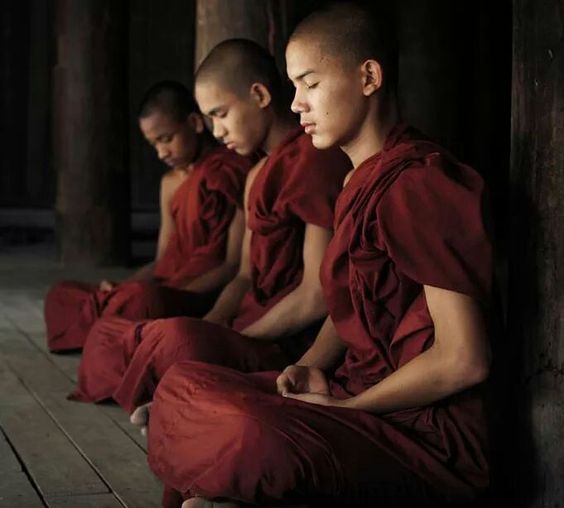
3. The path of learning and practice for old people
You can take some basic doctrinal classes before applying to practice or pursuing a domestic or international bachelor’s Buddhist program according to your ability. For the elderly, prioritize learning the fundamental teachings for practice before pursuing a long path of dhamma study to avoid wasting time in old age, as practice is essential to sow the seed on the path to liberation. In the Mahaparinibbana Sutta, the Buddha claimed: “Paripakko vayo mayhaṃ, parittaṃ mama jīvitaṃ.” (I am now too old; my lifespan is short.)
“Handa dāni bhikkhave āmantayāmi vo, vayadhammā sankhārā appamādena sampādetha.”
(Decay is inherent in all compounded things. Hence, strive with mindfulness and diligence to complete the task.)
Expectantly, with a short-sighted individual perspective, the above information can provide a suitable map to determine your study goals from the beginning and diligently move forward. If we can fulfill the two duties of nourishing dhamma learning and practice, it can be demonstrated that we are breathing according to the Buddha’s instructions so that we can benefit sentient beings. Why?
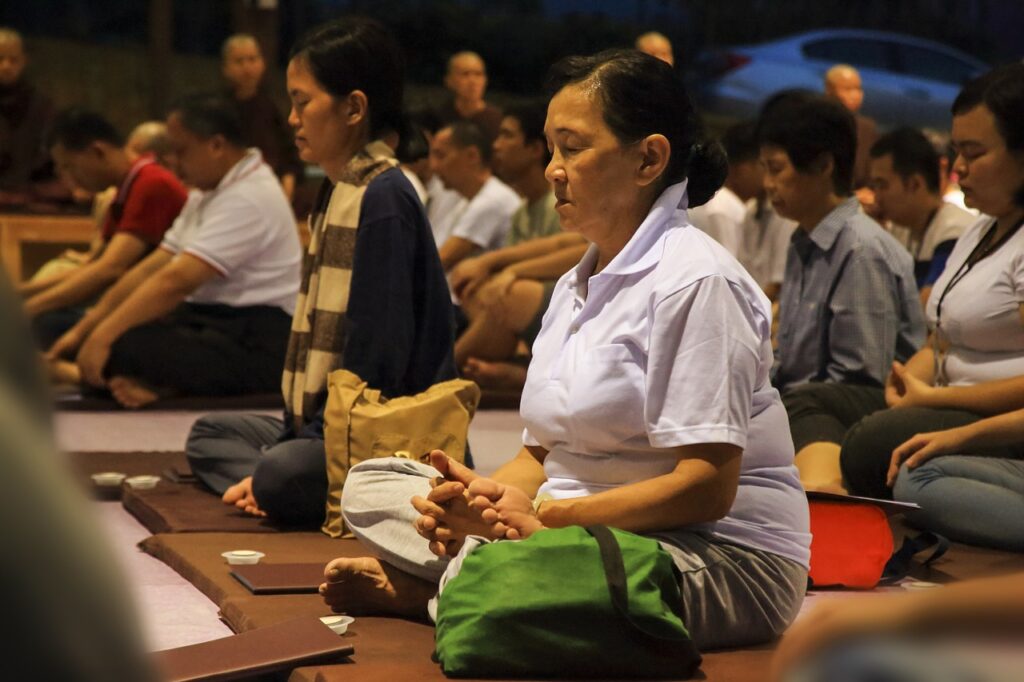
“Tadassa bahujanahitāya bahujanasukhāya lokānukampāya atthāya hitāya sukhāya devamanussānaṃ“
(For the peace and benefit of the many,
Originating from compassion for life,
For the peace and happiness of Gods and humans.) (4)
Only when we practice according to the Buddha’s teachings will we have the ability to transmit the Dhamma to future generations as a legacy that can instruct deities and humans.
(1) (4) D.ii.3 (184) Maha Parinibbàna Sutta (The Great Parinibbàna Sutta)
(2) MA.II.iv.1 (The GhaṭīkāraSutta)
(3) Knowing and seeing – Pa Auk Sayadaw
Sayalay Vijjāñāṇī (Tue Minh)
